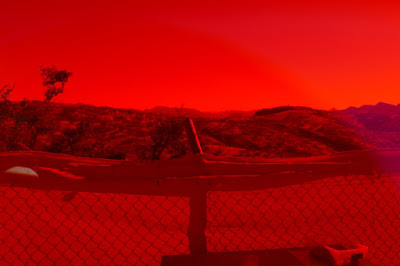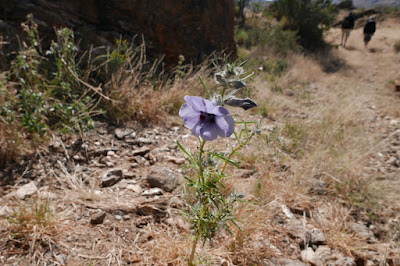"Wow!" "Amazing" "Wonderful!" "Unbelievable!"
Many were the superlatives that were uttered during the first night under a clear and incredibly dark Namibian sky. For me, it was a happy reunion. For my group of friends, an astonishing new experience.
The flight from Frankfurt left the European continent. Soon we were over Africa. A continent sparsely populated. An night image shows large pathes of mostly dark areas. Just spotted with a few smaller and larger cities here and there. I had been there many times. And the past two years, I had come here to not just look at the dark skies, but to exploit them. Taking photos of objects that are either too low or even under the horizon from my usual spots in Norway.
I never sleep much on any means of transportation. And this was no exception. I tried to close my eyes and let my body take me into dreamland. But it just wouldn't do it. So I just lay, or more precisely, sat there with my eyes closed.
A few hours into the flight, somewhere over Cameroon, I notices a large flash outside the windows. My initial thought was that the flash was just the lights on the wing flashing into moisture. But I soon realised that it didn't come from the airplane. It was from the ground underneath us. I tried to locate the source, and after about 10 minutes, squeezing my face onto the window pane, I could see that we were approaching a thunderstorm. The lightning was ripping the clouds and illuminating large areas. I pulled out my camera, and tried to film the beautiful event. I love thunderstorms, and the fireworks display west of our flightpath was amazing. I was smiling. My tiredness was gone. A welcomed treat.
We arrived one hour early. It was cold. Only 3 degrees C. I had opted for shorts, and had regretted that during the flight, and now even more. I was eager to get into the terminal building for passport control. I and my friends were among the middle of the people coming off the plane, but due to some poor choices in the passport queues, I ended up being third last to pass passport control. The ordeal took more than one hour. But finally I got my stamps and was admitted into Namibia. My backpack was waiting for me on the conveyor belt. I picked it up and walked through customs to meet my friends on the other side.
Our transport hadn't appeared yet, so we spent the time changing some money for a short trip into Windhoek and buy snacks and the life elixir of the amateur astronomers at Harestua Solar Observatory : Chocolate...
The landlady at Hakos Guestfarm showed up and we packed the car with bags, suitcases and backpacks. Ready for the long drive to Hakos. But first we went into Windhoek were Waltraud drove us around on a short sightseeing tour of the city before stopping at a gas station for gas and snacking (we realized that it was Sunday, and this was Africa. No Sunday open shops...).
The trip to Hakos went as always, rumbling on gravel roads. Sleeping after the long sleepless flight, and the occationaly baboon or ostritch sitting by the road.
After arriving, settling into our rooms and eating breakfast, the first order of the day was to inspect the gear we had rented. It was all laid out on a terrasse below the main house. We had rented three telescopes together for visual observing, and two of us had rented tracking platforms to put out astrphotogear on. For deep sky photos.
As for most of the winter in Namibia, the skies were clear, and all of us was preparing for a night under the skies.
 |
| My photogear installed and ready for the night |
An area where astronomers meet to observe the night skies, is often referred to as "red light distrct". This is due to the fact that only red lights are accepted. Our eyes are not very sensitive to red light, so in order to preserve our night vision, we only use red light. On this trip, we also decided to buy som red glasses to cover our eyes in case we needed to go to places where there wasn't red light. Below is a photograph taken through my glasses to show how we want our eyes to adapt.
And here is me sporting my astrogoggles. They actually worked remarkably well as sunglasses. They covered my prescription glasses perfectly, so I used them for most of the day.
 |
| All of our gear inspected and ready for the night. |
 |
Nightfall, with swallows flying through the air to their nests underneath
the roof of the main building. We would occationally har them during
the night. |
After a few nights under the skies, four of us decided to take a walk to something called "Walter's point", about 45 minutes walk from the main house. The name stems from Walter Straube who started the guestfarm back in the days. He died two years ago and is buried on the farm. His daughter is now running the place.
 |
| View back towards the farm |
 |
| Beautiful views |
 |
| Rest in peace |
The walk was also a reminder of two facts : Even in the desert, there is a place for life and beauty. And the desert is not to be taken lightly. We found this flower in the middle of the trail. Like a defiant reminder that it will not be downtrodden and forgotten. But will still lift towards the light and spread its beauty.
But if you do not take the desert seriously, it will punish you dearly, as these two animals found at such a high cost.
 |
| Most of this Kudu antelope had decayed, leaving only literally the skin and bones |
 |
| Beautiful light in the afternoon. |
One of the days, we got a guided tour of the farm and its many observatories. All of them with a lot of gear that can make even the most calm and composed amateur drool. But the following was by far the biggest display of "astro-porn" on the site. A 20 inch telescope on top of a world class precision mount far above my normal price range. I think I started drooling at one point.
But of course, our main focus for being here, was the night sky. Superlatives have been many and not far between. The beauty of the night skies are simply stunning. With star clusters, galaxies far far away (...) and nebulas in all the colours of the rainbow. All scattered across a sky so dark it makes your heart bleed when thinking of the light polluted skies back home. Where you can barely see the stars some places.
And it makes me wonder at times : What have we lost by lighting up the night? It may make us feel safe, althought in many cases it doesn't actually make us safe. But we have lost the night. We have lost the awesome and humbling view of the billions of stars encompassing our existence. And that might have caused us to ignore the obvious fact of our insignificance in it all. Maybe we all need to turn off the lights once in a while, and on a clear night, lay down on the ground and let the view humble us into getting off our self-inflating thrones of significance. And just realize who we are in it all.
Ragnar,
Amateur astronomer with the permanent travel bug syndrome





































































